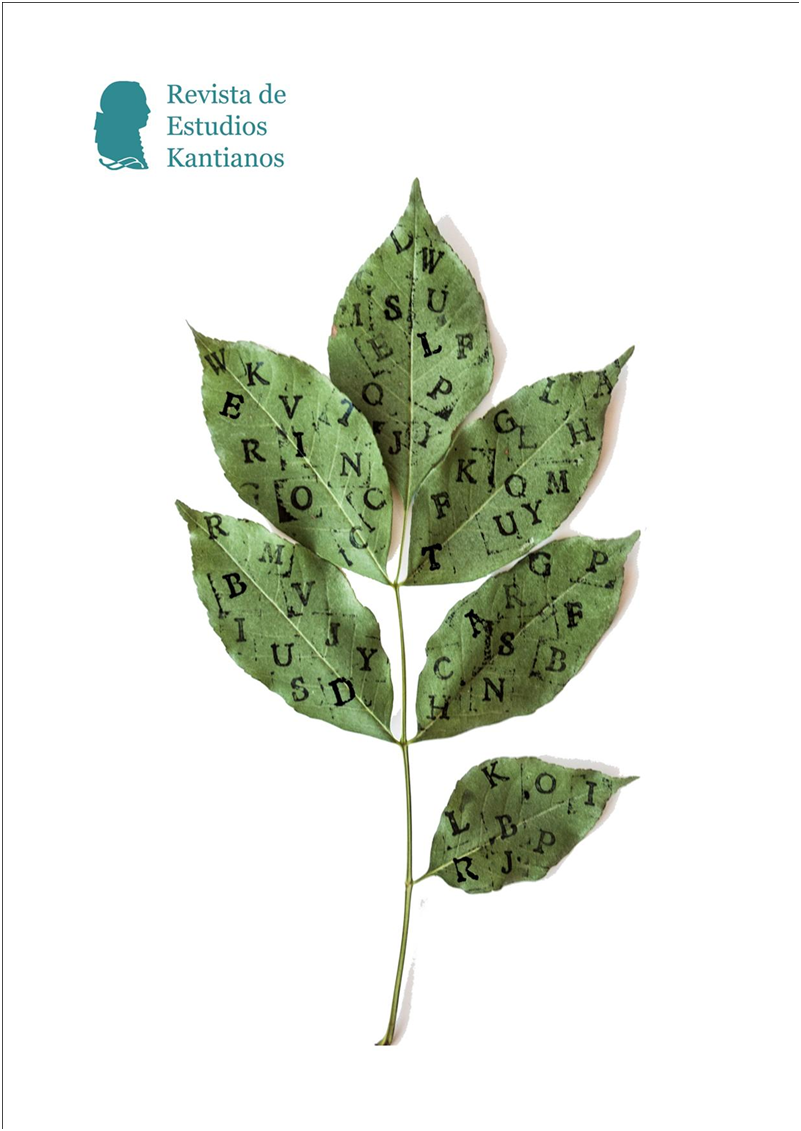Acerca de la estructura argumentativa de la Estética Transcendental
DOI:
https://doi.org/10.7203/REK.8.1.26488Keywords:
Estética transcendental, Espacio, Tiempo, Método analítico, Método sintético de argumentación, Intuición pura Abstract
Abstract
En este artículo se ofrece una interpretación de la estructura de la Estética Transcendental. La tradición ha considerado esta parte de la KrV como si se refiriera sólo al espacio y al tiempo, y no estudió suficientemente la estructura del argumento que se ofrece allí. Si se analiza tal línea argumentativa, se advierte que Kant sigue un método riguroso y preciso, combinación de sintético y analítico, que le permite partir de la afección, descubrir la sensibilidad, su materia, sus formas, y finalmente concluir que las nociones de espacio y tiempo son justamente las formas de la sensibilidad.
 Downloads
Downloads
 References
References
Adickes, E. (1929). Kants Lehre von der doppelten Affektion unseres Ich als Schlüssel zu seiner Erkenntnistheorie. J. C. B. Mohr.
Baum, M. (1991). Dinge an sich und Raum bei Kant”. En G. Funke (Ed.), Akten des Siebenten Internationalen Kant-Kongresses. Kurfürstliches Schloß zu Mainz, 1990 (pp. 63-72). Bouvier.
Blattner, W. (1995). The Non-Synthetic Unity of the Forms of Intuition in Kant's ‘Critique of Pure Reason’”. En H. Robinson (Ed.), Proceedings of the Eighth International Kant Congress, Memphis (vol. 2, pp. 169-177). Marquette Ubiversity Press.
Buchdahl, G. (1991). A Key to the problem of Affection”. En G. Funke (Ed.), Akten des Siebenten Internationalen Kant-Kongresses. Kurfürstliches Schloß zu Mainz, 1990 (pp. 73-90). Bouvier.
Caimi, M. (1982). Kants Lehre von der Empfindung in der Kritik der Reinen Vernunft: Versuch Zur Rekonstruktion Einer Hyletik der Reinen Erkenntnis. Bouvier.
Chenet, F.-X. (1993). Que sont donc l’espace et le temps? Les hypothèses considérées par Kant et la lancinante objection de la “troisième possibilité”. Kant Studien, 84, 129-153.
Dotti, J. (1989). Die Einwürfe der einsenhenden Männer. En G. Funke y T. M. Seebohm (Eds.), Proceedings of the Sixth International Kant Congress (vol. II, 1, pp. 3-18). The University Press of America.
Gómez, R. (1991). Science and Analytic Wholes. En G. Funke (Ed.), Akten des Siebenten Internationalen Kant-Kongresses. Kurfürstliches Schloß zu Mainz, 1990 (pp. 463-472). Bouvier.
Herz, M. (1990). Betrachtungen aus der spekulativen Weltweisheit. Neu herausgegeben, eingeleitet, mit Anmerkungen und Registern versehen von Elfriede Conrad, Heinrich P. Delfosse und Birgit Nehren. Felix Meiner.
Hinske, N. (1991). Die Wissenschaften und ihre Zwecke. Kants Neuformulierung der Systemidee. En G. Funke (Ed.), Akten des Siebenten Internationalen Kant-Kongresses. Kurfürstliches Schloß zu Mainz, 1990 (pp. 157-177). Bouvier.
Hintikka, J. (1973). Logic, Language-Games and Information: Kantian Themes in the Philosophy of Logic. Clarendon Press.
Kant, I. (1986). Briefwechsel. Auswahl und Anmerkungen von Otto Schöndörffer, bearbeitet von Rudolf Malter und Joachim Kopper [1873]. Felix Meiner.
Nagel, G. (1983). The Structure of Experience. Kant’s System of Principles. The University of Chicago Press.
Parsons, C. (1992). The Transcendental Aesthetic. En P. Guyer (Ed.), The Cambridge Companion to Kant (pp. 62-100). Cambridge University Press.
Paton, H. J. (1970). Kant's Metaphysic of Experience: A Commentary on the First Half of the Kritik der Reinen Vernunft [1936]. MacMillan/G. Allen & Unwin.
Pippin, R. (1982). Kant’s Theory of Form. An Essay on the Critique of Pure Reason. Yale University Press.
Pitte, F. V. de (1995). Kant's Problems with Space and Time. En H. Robinson (Ed.), Proceedings of the Eighth International Kant Congress, Memphis (vol. 2, pp. 179-186). Marquette University Press.
Riehl, A. (1924). Der Philosophische Kritizismus. Geschichte und System, vol. 1. [1876]. Alfred Kröner Verlag.
Torretti, R. (1980). Manuel Kant, Estudio sobre los fundamentos de la filosofía crítica, vol. 2. [1967]. Charcas.
Vaihinger (1970). Kommentar zu Kants Kritik der reinen Vernunft [1892]. Aalen.
Published
How to Cite
-
Abstract489
-
PDF (Español)246
-
EPUB (Español)69
Issue
Section
License
![]()
The authors who publish in this journal agree with the following terms:
- The authors retain their copyright and guarantee to the journal the right to be the first to publish the work and to license it under a Creative Commons Attribution License that allows others to share the work with an acknowledgement of its authorship and the initial publication in this journal.
- Authors may separately establish additional agreements for non-exclusive distribution of the version of the work published in the journal (for example, placing it in an institutional repository or publishing it in a book), with acknowledgement of its initial publication in this journal.
- Authors are allowed and encouraged to disseminate their work electronically (e.g., in institutional repositories or on their own website) before and during the submission process, as this can lead to productive exchanges as well as earlier and greater citation of published work (see The Effect of Open Access).








